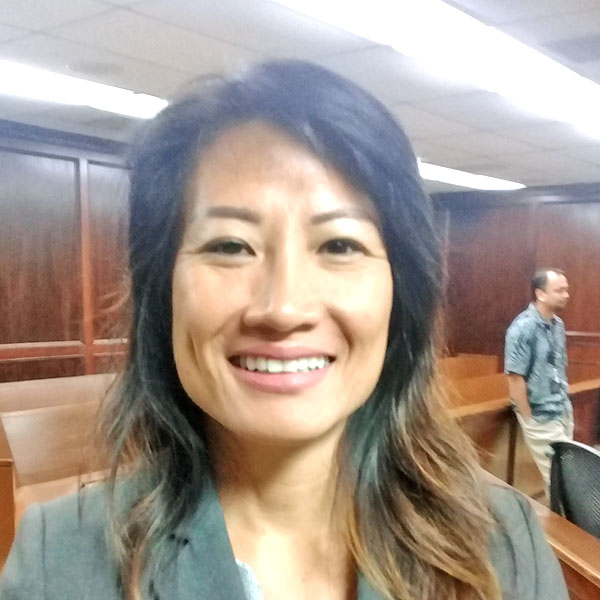King discloses strategies pursued to defend Crisostomo
In a declaration used to support the Office of the Attorney General’s response to a petition for writ of habeas corpus, attorney Janet H. King disclosed the strategies that she and two co-counsels did as then-defense counsel for Joseph Acosta Crisostomo, who was subsequently convicted for murdering, raping, and robbing a bartender in 2012.

King
In her declaration, which was issued last Aug. 28 and was filed before the Superior Court last Sept. 27, King said the defense team’s strategy was to attack the opinion of Federal Bureau of Investigation DNA analyst Susanna Kehl’s personal interpretation of the DNA evidence based on her methods—not her actual methodology on her curriculum vitae.
King said the defense team considered that Kehl’s actual methodology on her curriculum vitae likely meet the Daubert standard for purposes of admissibility. Daubert refers to a hearing held before trial to determine whether a proposed expert meets the requirements.
As such, King said, the defense team placed less emphasis on pursuing a Daubert hearing as to exclude Kehl’s opinion as an “expert” and placed more emphasis on her interpretation of the DNA evidence.
Citing DNA evidence, the prosecution said Crisostomo’s semen was found in the victim’s vagina.
Kehl testified that the chance that Crisostomo’s DNA would match another Chamorro would be one in 960 million. She said that will take some 22,000 Saipan islands to find Crisostomo’s DNA match.
Crisostomo has written a handwritten petition for habeas corpus addressed to Superior Court Presiding Judge Roberto C. Naraja, in which he accused his former lawyer, King, and her co-counsels from Guam, of providing him ineffective assistance. He named as respondents in his petition the Department of Corrections and then-DOC commissioner Vince Attao.
Habeas corpus refers to a court order to a person (prison warden) or institution holding someone in custody to deliver the imprisoned individual to the court that is issuing the order.
In DOC and Attao’s response to Crisostomo’s petition, assistant attorney general Jose Mafnas Jr. asked the court to deny the petition in its entirety. Mafnas attached King’s declaration to support DOC and Attao’s arguments.
In her declaration, King said one of the defense team’s defense strategies against Kehl was to communicate to the jury that Kehl subjectively interpreted the DNA evidence, and that a machine did not interpret the DNA evidence as to provide an objective conclusion.
The intent of such strategy was to overcome any personal prejudices in favor of the strength of DNA evidence, King explained.
King was the lead defense in the case. She was assisted by Randal Cunliffe and Jeff Moots, who are based in Guam. Dr. Joseph Haymer served as their DNA expert.
She said that throughout her representation of Crisostomo, she received advice and recommendations by Haymer on the veracity of the DNA evidence against Crisostomo.
King said that, after receiving initial discovery materials concerning DNA evidence to be used against Crisostomo, Haymer advised her to file a motion to compel discovery of more documents.
Specifically, Haymer advised King to request Kehl’s case file materials such as her bench notes, chain of custody forms, and other available materials. The purpose was for the defense team to form a strategy to attack the methodology that Kehl relied on to arrive at her opinion/interpretation regarding the DNA evidence found at the scene of the crime.
King said the OAG prosecutors assigned to the case were cooperative and very responsive to her discovery requests for documents regarding DNA and the FBI lab.
After filing the initial motion to compel discovery on Aug. 23, 2013, the OAG then asked for Kehl’s case file materials. King said she immediately sent copies of the materials to Haymer for his analysis and preparation.
King said Haymer later represented to her that had enough information to study Kehl’s analysis and interpretation of the DNA evidence.
She said Haymer did not represent that he did not have adequate time to evaluate the pertinent material such as Kehl’s lab reports and other subsequently requested information regarding her case file.
King said she also filed a second motion to compel discovery, but this motion focused on other pieces of forensic evidence.
In DOC and Attao’s response to Crisostomo’s petition, Mafnas said petitioner has not met his burden and is not entitled to relief. Mafnas said Crisostomo has failed to prove ineffective assistance of counsel.
Mafnas said an evidentiary hearing is not warranted as the record is enough to show that King and her defense team, including Haymer, were able to meet a meaningful defense and attack on Kehl’s testimony through an extensive cross-examination.
In Crisostomo’s reply, Cong Nie, the newly appointed counsel for Crisostomo, said it is extremely rare for two persons to have identical DNA profiles.
Nie said Kehl’s testimony started with an assumption that the major contributor’s DNA profile was Crisostomo’s.
“It was meaningless and misleading to discuss how rare a different person would have that profile—the real question was, was the major contributor’s DNA profile the same as Mr. Crisostomo’s in the first place (or, if it could not be determined with certainty, how likely was it),” Nie said.
Nie said that question, as undisputed by DOC and Attao, was never answered by Kehl at Crisostomo’s trial.
Naraja assigned Crisostomo’s petition to himself.
On April 24, 2014, a jury found the then-40-year-old Crisostomo guilty of first-degree murder, kidnapping, sexual assault in the first degree, and robbery.
Associate Judge Joseph N. Camacho, who presided over the trial, sentenced Crisostomo to life imprisonment.
The victim, Emerita R. Romero, 37, was last seen boarding a car near her house in Garapan in the early morning hours of Feb. 5, 2012. She was supposed to meet her boyfriend in Chalan Piao. Two days later, FBI agents found her body in a small bathroom at the abandoned La Fiesta Mall in San Roque/As Matuis.
In July 2018, the CNMI Supreme Court affirmed Crisostomo’s convictions.























